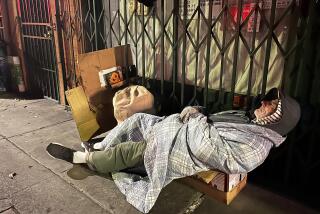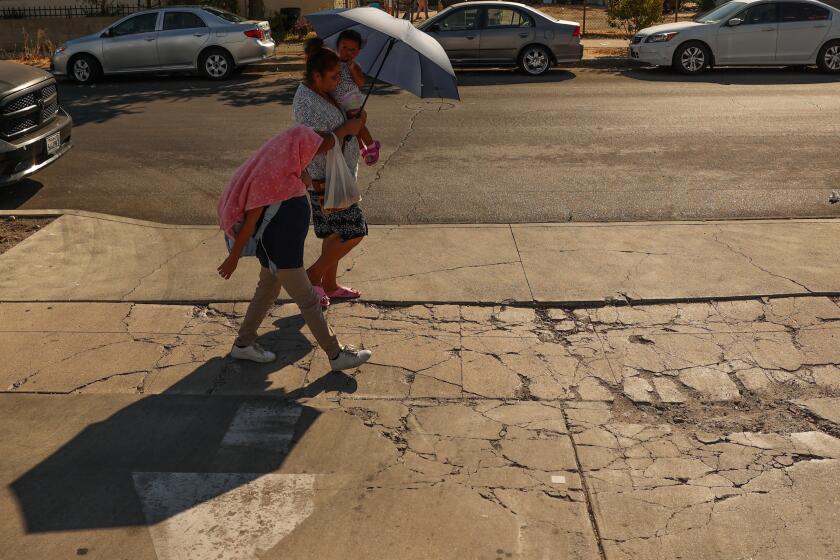Live and let live -- nah . . .
As the proposed two-year moratorium on new fast-food restaurants in South Los Angeles wends its way through the City Council, the zoning debate over a long-planned Orthodox synagogue continues to simmer in Hancock Park. In both cases, the hullabaloo can be heard for miles. What can be learned from this? Not much other than a) if there’s anything we fear more than poor people, it’s poor people with high cholesterol, and b) freedom of traffic flow trumps freedom of religion. And, let’s face it, we’re not even too sure about those.
The good news, however, is that L.A.’s noisy efforts to attach laws to personal values seem downright heroic compared with what’s happening elsewhere. In Oregon, for instance, laundry has gone political. The Wall Street Journal reported Tuesday that a homeowner in a Bend subdivision faces legal action for drying her laundry on an outdoor clothesline, an act effectively forbidden by the neighborhood covenant. (It seems the environmental benefits of line drying don’t sufficiently counteract the low-rent ramifications.)
Then there’s the ongoing George Orwell-meets-David Lynch saga playing out in Orem, Utah, where a woman was arrested this summer for neglecting to water her lawn. On July 6, a police officer visited the home of 70-year-old Betty Perry to inquire about her brown grass. When she refused to give her name, she was taken into custody and, later, charged with a “landscaping violation.” She has pleaded not guilty and is now being represented by famed L.A. attorney and talk-show host Gloria Allred.
No word on whether F. Lee Bailey will be taking on the clothesline case, but one thing seems clear: Americans’ hatred for being told what to do is matched only by our love for telling other people what to do. A constant “Survivor”-style showdown drowns out neighborhood serenity, a knockdown drag-out between synagogue-advocating, clothesline-loving, brown yard-tolerating, Burger King-neutral civil libertarians and social-contract types for whom these are scourges that represent the downfall of civilization (the same folks who have a thing or two to say about flip-flops on airplanes). We seem willing and able to engage in an unending debate about exactly what’s acceptable and what’s not.
It’s easy to accuse zoning boards and planning agencies of race- and class-based overzealousness, and even easier to laugh at cops who arrest people for lackluster lawn care, but don’t most of us have a punitive streak that makes such scenarios strangely (and alarmingly) delicious?
Personally, dead lawns and exposed laundry aren’t on my top 10 list of pet peeves. And although it may seem like fast food is all there is to eat in South L.A., anyone who’s taken a road trip lately knows that’s pretty much all there is to eat anywhere in the entire country. But there’s plenty else I’d love to throw the book at; just because they’re not exactly crimes doesn’t mean they’re victimless.
For instance, I’d thrill to see a woman being arrested for wearing sweat pants with some word or phrase, such as “Luscious” or “Bad Girl,” written across the butt. I’d also pay money to sit on the jury of the first-ever case of the People vs. the Purveyor of the Obnoxious Ring Tone. As for the State of California vs. That Guy Who Thinks 1970s-style Super-Short Running Shorts Are Appropriate Bookstore Attire, I’d pay double.
So, despite the fact that I have worn flip-flops on airplanes and, while flying Southwest, once pretended to have a body twitch so that no one would choose the seat next to me (warning: don’t try this; some people actually get turned on), I’m still a fan of the social contract. We all have to give up certain rights for the sake of an orderly society. It is, for example, the reason most of us shower regularly, even though we may not always want to and we’re not obligated under law.
But because the question of what makes a society orderly is in the eye of the beholder, attaching statutes (or neighborhood covenants) to what are essentially matters of personal values and taste is problematic, to say the least.
Granted, issues like who can prevent a place of worship from being built and why, or whether fast-food chains should be able to expand ad libitum in obesity and diabetes-prone communities, are in a different league from clotheslines and brown grass. But, when you think about it, maybe they shouldn’t be. After all, a steady diet of Big Macs could harm your health, but ugly lawns and windblown jockey shorts could drive down real estate prices. And depending on where you live, that in and of itself could lead to heart attacks.
Maybe it’s time to stop being so bossy and start compromising before we’re pointing fingers at each other in front of the Supreme Court. Just pipe down, dial it back. As mothers say nowadays, if you don’t have anything nice to say, wear it across your butt.
More to Read
Sign up for Essential California
The most important California stories and recommendations in your inbox every morning.
You may occasionally receive promotional content from the Los Angeles Times.










